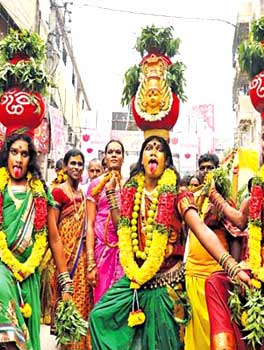Bonalu - Telangana - Festivals

Every twelve months, the special event for goddess mahakali is celebrated everywhere in the parts of telangana and the twin cities Hyderabad and secunderabad. This festival is observed in the months of July and august (ashada masam).
The initial and final day of this festival are made with special pujas. The word bonalu is derived from the word “bhojanam” which means “full meals”. This festival is devoted to goddess kali Devi who resides as mysamma, yellama, pochamma, dokkalamma, pedamma, poleramma, ankalamma, maremma, nookalamma etc.
History of bonalu festival
The emergence of this festival dates back to 1213AD in the twin cities Hyderabad and secunderabad also linked with “regimental bazaar”. In those days, people were not aware of diseases and their effects since they are uneducated. As the years goes, people with extraordinary mind invents something useful to the ages. Likewise, the people of twin cities were affected by deadly disease called plague. Since the people were not updated, this toxic disease took away the large number of people’s lives.
Regrettably, the military squads from Hyderabad were deployed to Ujjain, Madhya Pradesh. When the hyderabadite squads came to know about the outbreak in the cities, they worshipped the mother goddess maha kaali in Ujjain. They prayed that they would establish the idol of goddess kali, if the disease is completely vanished. Soon after their prayer, the disease got vanished and people got back to their normal state. As per their prayer, the military battalion installed the deity of goddess kali in their cities.
From that day, the festival of bonalu is emerged and it is celebrated till date. Other history tells that goddess kali will down to earth in ashada masam i.e. in the month of July and august.
Rituals
Women are considered as goddess, if you treat them well they treat you with much more affection. If you fail to treat them well, be ready to face the wrath of supreme goddess. This festival is compared to a girl, who is married and then returns to her born place and comforted by their parents.
On this spiritual day, women are dressed up with traditional saree with jewels. Teen girls wrap half sarees or lehengas cholis along with jewels which gives the traditional smell. Women colour their faces with turmeric. They wore large bhindi on their forehead. Women carry brass pots or mud pots on their heads. These pots contain rice, jaggery, curd, sugar and sometimes onions. These pots are called as “bonam”. They are adorned with turmeric, vermillion, white chalk, neem leaves and burning flame on top. The women are led by dancing men, drummers, performers.
It is believed that these women are the reflection of goddess. Since they are considered as goddess people used to wash those women’s feet by turmeric water, vermillion water. Some devotees offer “thottelu” (colourful paper like structure supported by sticks) as a mark of respect.
Celebrations
The celebrations starts at Sunday in twin cities in ashadam month. And the day is called as “edurukolu” i.e. the goddess will come to home in “ghatam” (copper pot which is adorned in the form of mother goddess). The third Sunday is “bonalu jatara” followed by “rangam” on Monday.
Pothuraju
Pothuraju is considered to be the brother of the goddess, who colours his body with turmeric and wore vermillion on his forehead. He is muscular, broad-shouldered and almost bare bodied. He wore small tightly red coloured dhoti, wore bells on his ankles.
He is the commencer and protector of the festivals. He dances before the procession. He is the person who leads the female dancers who are taking part in this festival.
Rangam
It is held after the dawn of an actual festival. Goddess Mahakali enters the women’s body and foretell the future when devotees asks about their upcoming events.
Ghatam
As it is explained that ghatam means decoration of copper pot along with neem leaves which will be carried by priests from initial day to final day. At the end of the festival, the priest will immerse the ghatam in water. The ghatam of haribowli’s temple akkanna madanna will lead the march by placing it on the heads of elephants accompanied by the horses.
The food offering
The food festival will be even grander, offering the meats, chicken to the mother goddess mahakali. Offering alcohol is also considerable. It is considered as blessed. In earlier days, buffalos are sacrificed for the goddess. But the strict government and growth of updated world controls the animal sacrifices. In most of the temples, these practices are stopped. But still these practices are happening in some of the temples. People replaced by pumpkin, coconut and lemons.
The temple includes Akkanna-Madanna, Laldarwaza, uppuguda, Miralam Mandi and Kasaratta, the Jagadamba temple of Sultanshahi, Bangaru Mysamma temple shalibanda, Alijah Kotla and gowlipura, and Sultanshahi, Darbar Mysamma of Aliabad, Mysamma Temple of boggulgunta (FGP) and Mutyalamma temple of Chandulal Bela also practice this fest.
Other temple includes Sri Ujjain Mahakali Devasthanam Secunderabad, Sri Devi Pochamma Temple Somasundaram Street Secunderabad, Sri Muthyalamma Temple at Kalasiguda, Sri Peddamma Temple at Bata cross roads, Sri Dokkalamma Temple Sivaji Nagar, Sri Muthyalamma temple Ashok Nagar, Sri Peenugula Mallanna Temple near Railway Station, etc. Out of these temples Sri Ujjain Mahakali Temple and Sri Devi Pochamma Temple Somasundaram Street are Government temples where festivities are visited by Government officials and legislators.
Month of Celebration : July / Auust
Location : Throughout Telangana